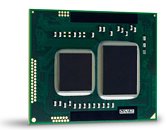Saturday, February 4th 2017

First Intel Processor with AMD Radeon Graphics Within 2017
Back in December, it was reported that Intel could license AMD's GPU technology for integration into its future processors. The whispers are growing louder, with Hard|OCP editor Kyle Bennett (who broke the original December story), reporting that the first product of this collaboration could be out within 2017. According to Bennett, posting on the Hard|OCP Forums, the first Intel product with AMD Radeon GPU IP could be a special processor with an AMD Radeon GPU die, and a CPU die based on the "Kaby Lake" micro-architecture.
Bennett further adds that the Radeon-enhanced Intel processor could be a multi-chip module (MCM) with the Radeon GPU die being separate from the CPU die, it won't be an on-die component such as Intel's own HD Graphics solution. This could also mean that AMD will supply nearly-finished dies to Intel, likely manufactured at its own trusted fabs (Global Foundries or TSMC), and not hand over sensitive designs over to Intel's fabs. The product could be an entry-mid range product, which means Intel is trying to aim for the value consumer segment, and not necessarily the workstation crowd. Bennett concludes that one could expect more collaboration between Intel and AMD over graphics IP in the future.
Source:
HardOCP
Bennett further adds that the Radeon-enhanced Intel processor could be a multi-chip module (MCM) with the Radeon GPU die being separate from the CPU die, it won't be an on-die component such as Intel's own HD Graphics solution. This could also mean that AMD will supply nearly-finished dies to Intel, likely manufactured at its own trusted fabs (Global Foundries or TSMC), and not hand over sensitive designs over to Intel's fabs. The product could be an entry-mid range product, which means Intel is trying to aim for the value consumer segment, and not necessarily the workstation crowd. Bennett concludes that one could expect more collaboration between Intel and AMD over graphics IP in the future.

77 Comments on First Intel Processor with AMD Radeon Graphics Within 2017
Unless it's a simple case of Intel throwing money at AMD so it can concentrate more on CPU design and stop wasting R&D on iGPU.
Hmm.... Need more info before chin rubbing starts.
That doesn't mean they're gonna start using radeon IP in their products.
This is something more.
Even if it's not exactly a Radeon, you know AMD will use it to say,"hey technically those are our parts so therefore, bite my market share nvidia boy."
Though, I don't understand the logic behind this move. Sure, it's a short term financial injection, but long term, they'll be eroding their own APU market. I mean, AMD's APU's have an edge because of Radeon core. Giving that to Intel and you're killing your only special thing about your CPU's. Because lets be honest, Intel GPU's, while they kinda get the framerate done, they are still garbage. I mean, it's 2017 and all they offer is Anisotropic filter ON or OFF. I've had up to 16x AF on like 5+ ? years old crappy E-450 APU. With 6x FSAA!
I think this is Intel pretty much saying "we're no longer interested in pursuing this, and are licensing the work of the specialists in the field", which is pretty commendable. Let's hope this translate into both better income for AMD and higher increases in IPC from Intel.
Personal opinion: the idea I get to chose which CPU I buy with my VEGA APU is kinda awesome. Ryzen/VEGA combo's would have an entire market-share to themselves otherwise, which is bad for pricing.
All in all, Intel probably is the company that stands to lose the most money but, can benefit from what it has to offer. AMD only stands to earn money since even in a worst-case situation, they'll have a source of revenue regardless if Ryzen lives up to expectations or not. If I'm interpreting this right, it should serve to stabilize both companies in a good way.
But sounds more like Bennett's wild theory that Raja wants to split RTG from AMD as a independent company..
buying a pc?, is it amd? then amd graphics (this includes both desktop and the apu/laptop markets)
buying a console?, do you want to game at high detail? then amd graphics
buying a console?, do you like wii sports? then amd graphics
buying a new graphics card? then amd graphics in not so insane price points
They may have regional monopolies, which get ignored often. I REALLY doubt a complete monopoly would be ignored, which is what Intel would have if AMD croaked. Intel has NEVER been the sole producer of x86 chips and those "decades" you cite had IBM, Cyrix, VIA, AMD, the list goes on...
And if you think that Intel hasn't had an effective monopoly on x86 forever....idk what to say. They fooled you, though.
Giving the most crooked people and organizations (corps/US govt) on the planet the benefit of the doubt is dangerous and stupid.